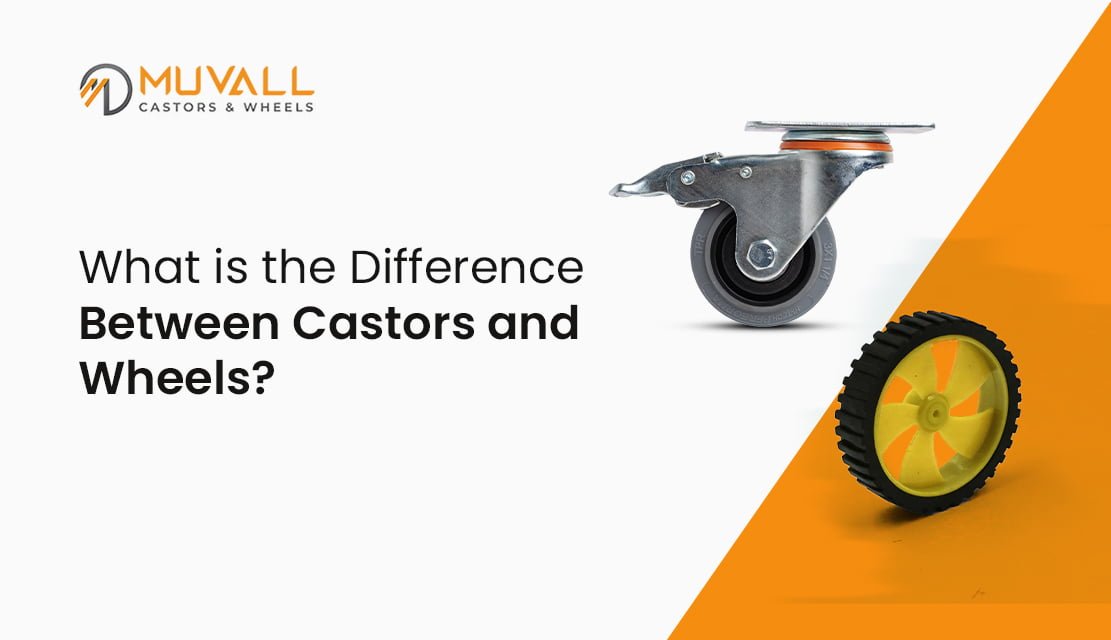
Businesses often need to move different goods and materials. Although much of this material movement occurs through vehicle transportation outdoors, workers also need to move huge volumes of goods from one place to another within warehouses, manufacturing plants, offices and other facilities.
At Muvall, we offer high quality castor wheels to help your business do just that! But remember, to manage material movements effectively, you must know the tools and technologies required to complete such tasks. Thus, knowing the difference between a castor and a wheel can not only help you identify the specific types of material handling and movement tools, but it can also help you optimize your business operations.
Many people do not know what castor wheels heavy duty are, and because of this, they confuse it with a wheel. The terms “wheels” and “castors” are often used interchangeably as both of them are rolling devices. But a castor is more than just a wheel! Castor and wheels differ in many ways. Continue reading the blog below to learn more about wheels and castors and how they differ from each other!
We all know what a wheel is and that it is used for many mechanical purposes. That is why this may seem like an obvious topic, but the answer can help you understand the castor vs wheel dynamic. One of the six classical simple machines, a wheel is a round object with a hole in the center for a spindle. One can also define a wheel as a circular cylinder that spins around on an axle on a flat stable surface like a ground or a track.
The way wheels function dramatically reduces the friction of an object and allows heavy things to be moved with less effort and energy. Although wheels were invented 5000 years ago and have been around for a long time, their origin is unknown. However, its significance was first recognized by the ancient Greek philosopher Archimedes.
Since its invention, wheels have changed the way humans live, create and work as engineers studied and used wheels in many new technological designs. Simply put, wheels have helped shape and advance human civilization. Today, wheels are available in different materials (plastic, rubber, steel, etc), sizes and types to suit various applications.
Now that you have clearly understood the meaning of wheels, now is the time to discuss castors. Let us start by asking a simple question- Have you ever used a cart in a grocery store? If so, then it means you have seen and experienced trolley wheels and castors in action. While castors can be called wheels, wheels cannot be called castors. That is because castors are special assemblies that have brackets (or yokes) and wheels in the middle and are made up of the rig.
Castors also include bearings, swivels and mounting plates that are used to attach the castor to different types of objects. For example, if we talk about carts in the grocery store, the cart here is the object that is attached to castors and wheels on the bottom. These castors allow the cart to move in various directions like forward and backward and left and right.
Because small castor wheels can mount various objects, they allow people to move materials and equipment easily around surfaces and floors in offices, worksites, hospitals, labs and more.
Although castors and wheels are similar in terms of design and some qualities, castors are a bit more sophisticated and differ from wheels in terms of appearance, applications and benefits. While a wheel can only spin on a single axis and can roll in only one direction at a time, a castor can roll in all directions.
Since some industrial trolley wheels and castors are swivel and others are fixed, the object mounted on a set of castors will either rotate in a straight line or in different directions. Moreover, in terms of installation, castors are easier to install than wheels, as you only need to screw or fasten a wheel to the object or equipment you need to move.
Now that we have reached the end of this blog, you must have understood that wheels are more basic than castors and castors are more complex. That is because they do not just roll back and forth and live up to their namesake by supporting swiveling movements. So, the next time you are confused about whether you require a castor or a wheel, make sure you choose the mobility solution that works best for you.
If you go with castors, Muvall, a leading manufacturer and exporter of industrial trolley wheels and castors, is here to help you out and offer you the best industrial castors for your specific applications. Check out our website today for more information!
Frequently Asked Questions (FAQs)
Ans. Usually, all the best castors and wheel manufacturers like Muvall offer castors in a wide variety of sizes, materials and designs. These simple and effective trolley wheels are classified based on how they work and how they mount on objects they allow to move. Here are the two basic types of castor wheels:
Ans. Industrial trolley wheels need to maintain their strength, functionality and structural integrity in different working conditions and environments. As a result, they come in a wide variety, and all castors are made differently and are used in different applications.
For example, castor wheels used in a manufacturing plant may need to withstand heavy loads. On the other hand, castors used in a chemistry lab may have to be exposed to many kinds of potentially corrosive substances. Therefore, businesses have to use different small castor wheels depending on the working environment and requirements. Some common castor wheel materials are:
Ans. Smooth and efficient mobility and ease of use are some obvious benefits of using castor wheels heavy duty. But these simple tools can also bring your business many other valuable benefits such as promoting a safe work environment, a healthier workforce and enhanced productivity.